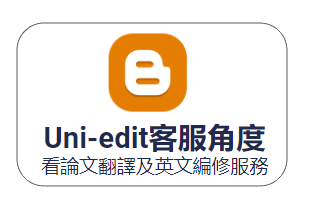難度:初階
研究最理想的情況,是客觀且無偏的,因為事實就是事實,而學術作者是事實的客觀報導暨分析者。
然而現實生活中,作者需平衡許多的利益和活動。舉例來說,張醫師同時是執業外科醫生和期刊審查委員,從藥廠收受研究經費,偶爾會代表醫療儀器公司發言;身兼多職常見於專業社會人士,法律也沒規定不能有多個收入來源,不過,一旦某個職位的動機違反另一個職位的職責,就出現利益衝突。
張醫師既然收A藥廠的經費,有意或無意間對A藥廠的藥做的測試,可能傾向報喜不報憂,或偏愛開A藥廠的藥給病人,但其實另一藥品或許更有效或更適合。
問題是收到A藥廠的經費,不代表張醫師一定會偏袒A藥廠的藥檢,更不能以此禁止他做A藥廠產品的研調。利益衝突是不當行為的可能性之一,額外透明度反有助建立信任;另利益衝突也將因人際關係而影響到研究的客觀性,或許更客觀,也可能是變差。
利益衝突是學術發表的正常現象。知名研究員的報告可能會產生利益衝突,但他的研究是誠實且合乎倫理。在投稿還有論文上面揭露利益衝突,尤其是經費方面,讀者會留意到研究是人為的行為,而且應謹慎看待研究結果。利益衝突並非無一是處,宣示是一項誠實的行為,意思是作者不需隱瞞任何事實,並值得信任的。
科學期刊十分認真看待利益衝突,一般會要求期刊作者在投稿時,特別聲明任何利益衝突之處。
有時關於利益衝突的聲明會簡化到像「Conflicts of interest: None(利益衝突:無)」;同義但更好的句子是「The authors have no conflicts of interest to report(本文作者聲明無利益衝突)」。參考想投稿的期刊是否在作者須知規定聲明格式,否則上述二者擇一即可。
Download Tip Here:  研究的利益衝突?
研究的利益衝突?
Uni-edit English Writing Tip 008: Do you have a conflict of interest?
Difficulty: Easy
In an ideal world, research is objective and impartial. The facts are the facts, and the academic author is the objective reporter and analyzer of these facts.
In the real world that you and I live in, authors have many interests and activities to balance. For example, Doctor Chang may be a practicing physician, serve on a journal review board, receive research funding from a pharmaceutical company, and occasionally speak on behalf of a medical device company. It is natural for professionals to serve many roles in society, and having several sources of income is not prohibited. However, when the motivation of one role infringes upon the duties of another role, this can present a conflict of interest.
If Doctor Chang receives funding from Pharmaceutical Company A, he might want to, consciously or subconsciously, report favorable findings about one of Company A’s drugs. He may be encouraged to prescribe the drug to his patients, perhaps when another drug would be more effective or appropriate.
Just because Doctor Chang receives funding from Company A does not mean he will always report results that are favorable to Company A, nor does it mean he cannot research investigating Company A’s products. A conflict of interest is just the potential for misconduct: a place where extra transparency can help build trust. A conflict of interest is where human relationships, for better or worse, could affect the objectivity of research.
Conflicts of interest are a normal part of academic publishing. A reputable researcher usually has conflicts of interest to report; however, he conducts his research honestly and ethically. By disclosing conflicts of interest, especially research funding, in your journal submissions and papers, readers are alerted that research is a human endeavor, and that the research results should be examined carefully. However, there is a positive aspect too. Declaring conflicts of interest is an act of honesty: it says the author has nothing to hide, and can be trusted.
Scientific journals take conflicts of interest very seriously. Journal authors are typically required to state any conflicts of interest in a separate section when they submit manuscripts.
Sometimes this statement is as simple as “Conflicts of Interest: None”. A good sentence meaning the same thing is “The authors have no conflicts of interest to report”. See if your target journal has a preferred format for stating conflicts of interest in their Instructions for Authors page; if not, one of the options above should suffice.



